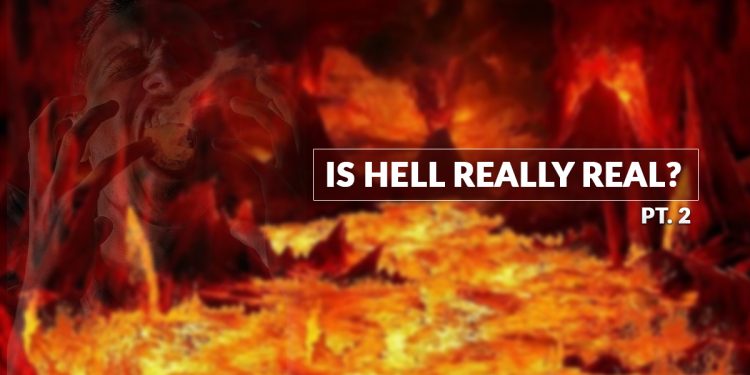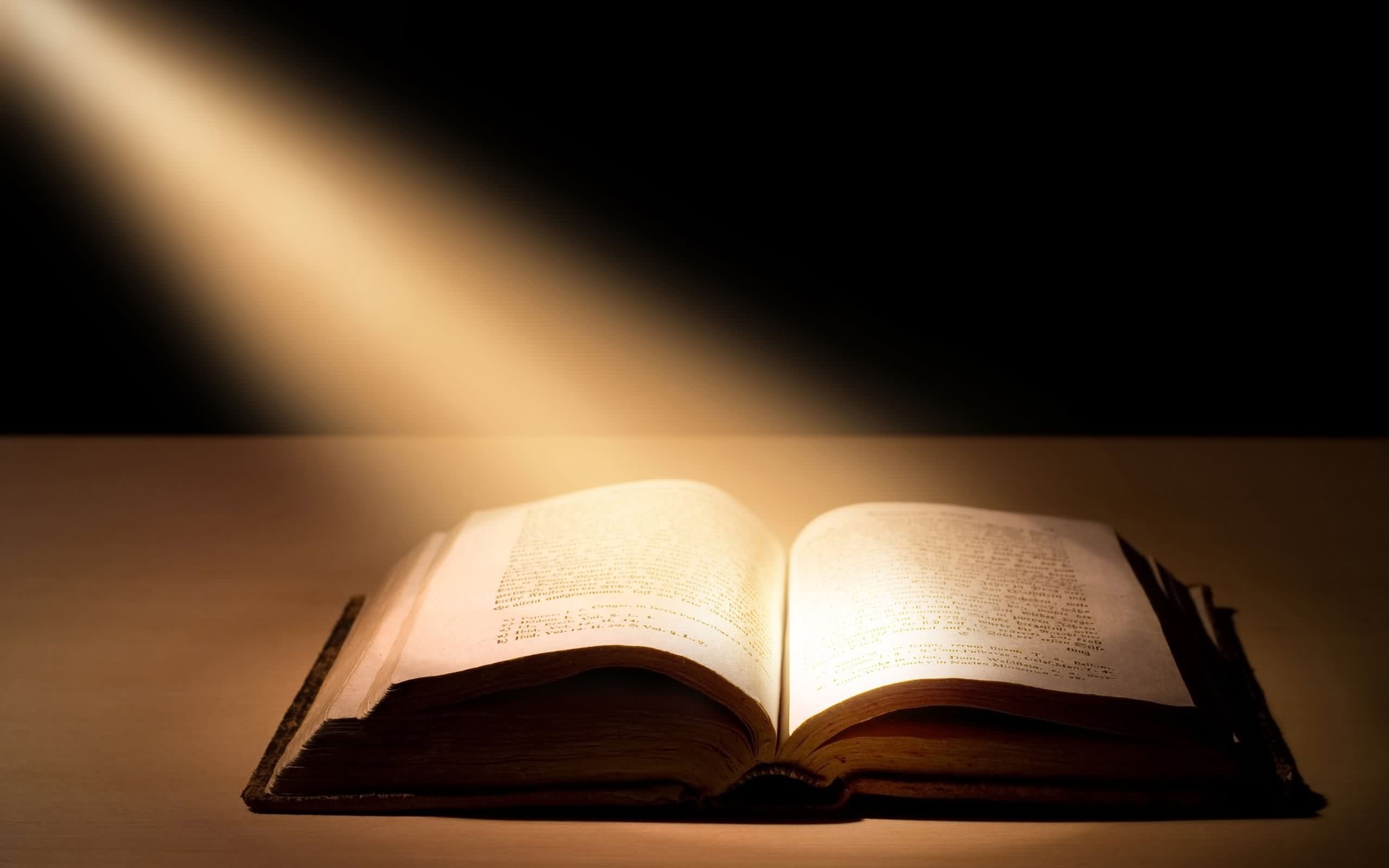Is Hell Really Real? Pt. 2

Back in 2014, I wrote Pt. 1 of this post, “Is Hell Really Real?” In it, I critiqued this statement from then-Fr. Robert Barron, in his otherwise excellent book, Catholicism (p. 257-258).
… though we must accept the possibility of hell (due to the play between divine love and human freedom), we are not committed doctrinally to saying that anyone is actually “in” such a place. We can’t see fully to the depths of anyone’s heart; only God can. Accordingly, we can’t declare with utter certitude that anyone—even Judas, even Hitler—has chosen definitively to lock the door against the divine love. Indeed, the liturgy compels us to pray for all of the dead, and since the law of prayer is the law of belief, we must hold out at least the hope that all people will be saved. Furthermore, since Christ went to the very limits of godforsakenness in order to establish solidarity even with those who are furthest from grace, we may, as Hans Urs von Balthasar insisted, reasonably hope that all will find salvation…”
I disagreed. We are “committed doctrinally to saying that [some souls are] ‘in’ such a place,” even though hell is not a “place” so much as a state of being. We are committed at the very least on the level of the Ordinary Magisterium of the Church. Moreover, to hope for an empty hell at the end of time would be a false-hope because both Jesus Christ himself and the One, Holy, Catholic, and Apostolic Church teach that there is a real hell that is populated with real human souls, as I shall demonstrate once again below.
Since that time, I have had quite a few back-and-forths with folks concerning this post. The overwhelming majority of people thank me for writing it. But every once in a while, I do get an attempt at defending the possibility of an “empty Hell.” Below are my ruminations resulting from several of these discussions.
A Problem with “Must”
When I first read Catholicism years ago, the “must” that I put in quotes above was particularly jarring to me. “We must hold out at least the hope that all people will be saved.”
Now, I should note, that statement was given in the context of rightly saying “the liturgy compels us to pray for all of the dead.” And it is true that the Church does not “hope” for anyone to go to Hell. So if by hoping all will be saved one simply means that we “must” express a desire—which is a kind of hope—that all would be saved, I get that. No problem. The problem comes when the conclusion is then reached that we may, as Hans von Balthasar insisted, reasonably hope that all will find salvation, and we will find an “empty Hell” at the end of time, at least, as it concerns human beings. That’s where the trouble starts.
The problems here are manifold. But first, just as a matter of common sense, let me use an analogy to help us understand that an expressed desire—and in that sense a “hope,” of sorts—that all be saved does not equate to the possibility that the stated desire be actualized. I have seven children. And I know my constant prayer for them expresses the same “hope” St. John expressed when he wrote I John to his disciples two thousand years ago:
My little children, I am writing this to you so that you may not sin…
What father does not pray in such manner? But would anyone say that because I know my seven children either have sinned (those over the age of accountability), or will sin (those under the age of accountability), that does not mean my prayer, “Dear Lord, keep my children from the ‘sin which clings so closely…’” is somehow void of hope? My desire, my hope, is that they never sin, but there is nothing in that desire, or hope, that means I must then hold even to the possibility that all of my children will actually be sinless.
That’s just common sense.
The Magisterium
The idea of a possibly empty hell runs flat into and contradicts both the word of God in Sacred Scripture and the very plain words of the Magisterium of the Church. One example among many I could cite from the latter is found in CCC 1034:
Jesus often speaks of “Gehenna” of “the unquenchable fire” reserved for those who to the end of their lives refuse to believe and be converted, where both soul and body can be lost. Jesus solemnly proclaims that he “will send his angels, and they will gather . . . all evil doers, and throw them into the furnace of fire,” and that he will pronounce the condemnation: “Depart from me, you cursed, into the eternal fire!”
The Magisterium of the Church here plainly teaches “Jesus solemnly proclaims that he will ‘send his angels, and they will gather… all evil doers, and throw them into the furnace of fire,’ and that he will pronounce the condemnation: ‘Depart from me, you cursed, into the eternal fire!” I added the italics, but that exclamation point does not originate with me. The emphasis here is in the Catechism. If it is possible that no one will be in hell at the end of time, then this declaration would be false. Jesus and the Church say, “there will be,” but it would turn out each would be in error. That is absurd!
Moreover, if the Church were to know this she describes may not be true, but she declares it as she does anyway, that would be a monumental deception! The Church and Jesus Christ in the Scriptures do not say “It is a possibility that Jesus might…” The Church and Jesus Christ declare this is going to happen. And this is true, doctrinally, from the perspective of magisterial teaching.
Responses I have received from folks attempting to defend a possibly “empty hell” claim the Catechism here is “only speaking of a possibility that there could be souls in hell. It may be that this possibility is never actualized.” But that is manifestly false. There are no subjunctives to be found here. No “maybe.” No “possibly.” No “might.” Only “he will…” “they will…” “he will…”
A Weak Defense
I have great respect not only for now-Bishop Robert Barron, but others who agree with his theology as well. Hans Urs Von Balthasar is another that I mentioned and responded to in my first post. But having said that, the reasoning given for dare we hope is remarkably weak. It seems invariably to come down to two points. First, the universal salvific will of God. And second, “the Church prays for all of the dead without qualification to be saved.”
In response, I always point out that of course we are going to pray for all of the dead because we don’t know which souls are in heaven (except the canonized) and which souls are in hell. But praying for all to be saved doesn’t mean all will be saved. Nor does it mean that is even possible as I said before. I know I believe Hell is populated with human souls. And I also know I have never prayed for “all to be saved… except for Eggbert McGillicutty over there, Lord… Not him!” Of course, we pray for everyone! But that prayer cannot and does not trump “’Jesus solemnly proclaims…’ and that he will pronounce the condemnation: ‘Depart from me, you cursed, into the eternal fire’!” (CCC 1034)? And it is a non sequitur to claim praying for “all” necessarily means it to be possible that all will be saved n the end.
Now, some have argued their belief in dare we hope that all be saved is rooted in our divine and Catholic Faith that teaches us God wills “all to be saved and to come to the knowledge of the truth” (I Tim. 2:4; CCC 1037). But again, it is a non sequitur to conclude from this desire that we have “reason to hope that all will be saved finally and actually,”—which is what an “empty Hell” would entail. That is to go beyond simply not willing that Joe Smith or any other individual will be lost. This would be tantamount to “hoping” Jesus Christ, who said, “These shall depart into everlasting fire, but the righteous into eternal life” (Matt. 25:46) will be proven to be a false prophet. That is something a Catholic cannot “hope” for. And this is not to mention it would contradict the Magisterial teaching authority of the Catholic Church. Which leads me to my next point.
Fourth Lateran Council
In my earlier post, I cited the Fourth Lateran Council’s famous “Confession of Faith” of AD 1215:
He will come at the end of time to judge the living and the dead, to render to every person according to his works, both to the reprobate and to the elect. All of them will rise with their own bodies, which they now wear (Latin – quae nunc gestant) so as to receive according to their deserts, whether these be good or bad; for the latter perpetual punishment with the devil, for the former eternal glory with Christ.
The Council Fathers, in very plain terms, indicate that people living in the year AD 1215 (and, by allusion, all of mankind) will rise with their bodies and that some will go to heaven and some will go to hell. But one fellow argued that this text is only arguing for the possibility that some will go to Hell. It does not say this will necessarily happen. But this is simply ludicrous. There are no subjunctives here either. And neither the word “possibility” nor the concept of possibility is to be found. Holy Mother Church speaks in the same language as her Lord and Master in Matthew 25:41:
Then he will say to those at his left hand, ‘Depart from me, you cursed, into the eternal fire prepared for the devil and his angels…”
And in Matthew 25:34:
Come, O blessed of my Father, inherit the kingdom prepared for you from the foundation of the world…
Notice, the Council declared “All of them will rise with their own bodies.” Would any sane person attempt to say this means “It is only possible that they will rise?” Of course not! Well, the Fathers then say, “for the latter (the bad) perpetual punishment, for the former (the good) eternal glory with Christ.” The text does not read: “it is possible if there are any bad…” or “the bad will possibly…” These words really do speak for themselves. Moreover, would any sane person interpret the latter to mean “if there are any good. It is only possible that some will go to heaven. There may be an empty heaven?” Of course not!
Bottom line: If there is the possibility of there being no bad, but only good at the last judgment this text becomes just as incoherent as the words of our Lord in Matt. 25:46:
And they will go away into eternal punishment, but the righteous into eternal life.
Pope St. John Paul II
For a modern Magisterial statement beyond the Catechism, I had many to choose from, but I chose a statement that originated from what was originally a controversial statement from Pope St. John Paul II. It was originally recorded in the L’Osservatore Romano, August 4, 1999, and it read:
Eternal damnation remains a real possibility, but we are not granted, without special divine revelation, the knowledge of whether or which human beings are effectively involved in it.
If allowed to stand, the terms “whether or” along with the remainder of this declaration would have added up to the first and only magisterial statement of the Church to ever proffer the possibility of an empty hell. However, that did not happen because those words were not allowed to stand. When this statement was placed into the AAS (Acta Apostolicae Sedis—all of the official statements of our Popes are placed there in their official form), “whether or” was edited out. Again, the pope’s original statement if made final would have been problematic to be sure. But after the removal of “whether or” it became another confirmation of traditional Church teaching. The official teaching of Pope St. John Paul II states:
Eternal damnation remains a real possibility, but we are not granted, without special divine revelation, the knowledge of which human beings are effectively involved in it.
There is no question as to “whether” or not there are souls in hell. There are, according to the Magisterium of the Church. The question is “which human beings are there.” And on this point, Fr. Barron was correct. The Church has never declared any particular human soul to be in hell definitively. In other words, we don’t have an analogue to canonization (an infallible act of the Church) to declare particular individuals to be in hell. That is true. But that there are souls in hell is not in dispute. That is the teaching of the Church. Pope St. John Paul II confirmed what has been the constant understanding of the Church in this declaration that now forms part of the Magisterial teaching of the Church.
One fellow responded to the above by saying, “This quote affirms that Pope John Paul II was personally open to the possibility that nobody was in Hell.” He even claimed that Pope St. John Paul II personally believed in the possibility of an empty hell.
In response, I have to say first that a pope’s “personal opinion” on a matter is moot. What matters magisterially, and what binds the Catholic faithful is what he teaches via his apostolic authority. But in this case, the fact is, we do know what Pope St. John Paul II believed both personally and magisterially. In his great book, Crossing the Threshold of Hope, written five years earlier, in 1994, which is not a magisterial document, he spoke to this very matter, on page 185:
Can God, who has loved man so much, permit the man who rejects Him to be condemned to eternal torment? And yet, the words of Christ are unequivocal. In Matthew’s Gospel he speaks clearly of those who will go to eternal punishment (cf. Matt. 25:46). Who will these be? The Church has never made any pronouncement…”
Thus, Pope St. John Paul was not “open to the possibility” of an empty hell, even in his personal, non-magisterial teaching. In fact, the change of the pope’s statement was most likely a correction to concur with John Paul’s stated earlier beliefs. But again, that is not what is most important. The fact that the statement of his Holiness was changed and with his approval (it has to be before it is placed in the AAS), tells us Pope St. John Paul II was making clear what he actually meant, as well as more importantly, what is the teaching of the Magisterium of the Church. The final version repeats precisely what he intimated in Crossing the Threshold of Hope. He said in both places that we do not know precisely who will be in Hell, but Jesus is unequivocal there are (present tense) human beings populating hell.
Sacred Scripture
The Scriptures are abundantly clear. We have already seen Jesus’ prophetic words from Matt. 25:41 and 46. “Then he will say to those at his left hand, ‘Depart from me, you cursed, into the eternal fire… And they will go away into eternal punishment’…” And there are many more biblical texts to choose from. But I’ve chosen these because of the definitive language used by the inspired authors.
Rev. 14:11:
And the smoke of their torment goes up for ever and ever; and they have no rest, day or night, these worshipers of the beast and its image, and whoever receives the mark of its name.
Rev. 20:10:
… and the devil who had deceived them was thrown into the lake of fire and brimstone where the beast and the false prophet were, and they will be tormented day and night for ever and ever… and if any one’s name was not found written in the book of life, he was thrown into the lake of fire.
Matt. 8:11-12:
I tell you, many will come from east and west and sit at table with Abraham, Isaac, and Jacob in the kingdom of heaven, while the sons of the kingdom will be thrown into the outer darkness; there men will weep and gnash their teeth.
Matt. 13: 41-42, 49-50:
The Son of man will send his angels, and they will gather out of his kingdom all causes of sin and all evildoers and throw them into the furnace of fire; there men will weep and gnash their teeth.
So it will be at the close of the age. The angels will come out and separate the evil from the righteous and throw them into the furnace of fire; there men will weep and gnash their teeth.
Luke 13:23-28:
And some one said to him, “Lord, will those who are saved be few?” And he said to them, “Strive to enter by the narrow door; for many, I tell you, will seek to enter and will not be able. When once the householder has risen up and shut the door, you will begin to stand outside and to knock at the door, saying, ‘Lord, open to us.’ He will answer you, ‘I do not know where you come from.’ Then you will begin to say, ‘We ate and drank in your presence, and you taught in our streets.’ But he will say, ‘I tell you, I do not know where you come from; depart from me, all you workers of iniquity!’ There you will weep and gnash your teeth, when you see Abraham and Isaac and Jacob and all the prophets in the kingdom of God and you yourselves thrust out.
These texts really do speak for themselves.






